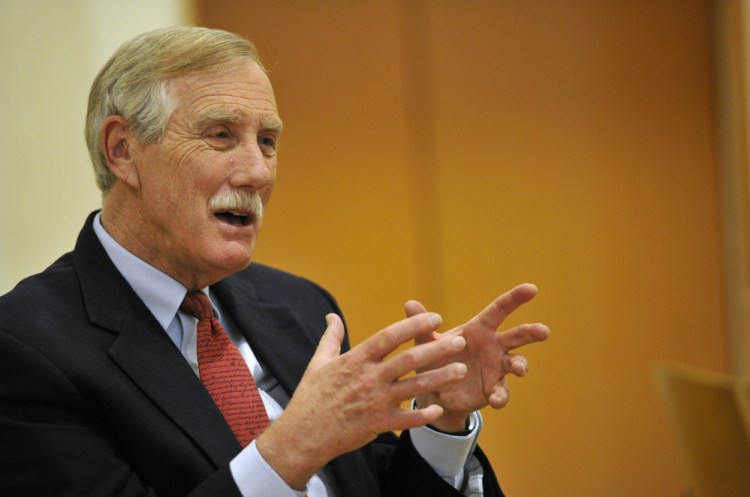BRUNSWICK — U.S. Sen. Angus King said Friday that despite robust intelligence gathering, Islamic State terrorist attacks are “more or less inevitable.”
Even so, Maine’s independent senator strongly cautioned against discriminating against or marginalizing Muslims, especially those in the United States.
“Number one, it’s not who we are. Number two, as we dig into these news reports from the last few days, and see people being caught, they are generally being caught because of tips that came from within the Muslim community,” King said. “An explicit part of ISIS’ strategy … is to drive a wedge between Muslims that live in the West and their societies so that they will then be radicalized and feel that they have no option.”
King spoke to reporters Friday at Bowdoin College near his home in Brunswick after a weeklong trip to Europe with four other members of the Senate Intelligence Committee: Chairman Richard Burr, R-North Carolina; Barbara Mikulski, D-Maryland; Dan Coats, R-Indiana; and Mark Warner, D-Virginia.
The delegation was in Paris on Tuesday when terrorist attacks about 200 miles away rocked Brussels, killing 31 people and wounding hundreds more. Suddenly, their trip took on a heightened seriousness.
The reaction to the Brussels attacks among officials in France, where a massive terrorist attack in November killed 130 people, was not one of surprise, but of resignation.
“It was not shock and surprise, they have been expecting something like this, particularly in Belgium,” King said. “I would call it disappointment and a renewal of determination.”
Asked if he was shocked, King said he was not.
“I think these things are more or less inevitable,” he said. “The difficultly in this country – the thing that keeps me up at night – are what I call lone wolf attacks. Someone who is an American citizen, is radicalized online, who gets a terrorist APB saying ‘go out and kill people’ and they go to their basement, get a gun and go somewhere.”
That’s why King said it’s crucial not to succumb to fear and stereotyping of Muslims, a reference to statements by Republican presidential candidate Donald Trump to ban Muslims from entering the country, and by Sen. Ted Cruz, R-Texas, also a candidate, to more closely monitor Muslim communities in the United States.
King said isolating Muslims in other countries has created “cauldrons of discontent and frustration.” He said there has to be a better way to protect U.S. citizens while preserving what makes the nation great.
“We are asymmetrically vulnerable because we are asymmetrically free,” he said. “And that makes us vulnerable to people willing to commit uncivilized acts. We don’t want to lose that. But if we stop moving, or traveling, or going places, that’s a small victory for (the Islamic State).
“A friend said to me, couldn’t we have prevented the bombings at the Boston Marathon? Yes, if we’d had National Guard troops shoulder to shoulder for 26 miles on both sides of the street. That’s not a world we want to live in. That’s not who we are.”
King said his biggest takeaway from the trip to Europe, which included stops in Poland, Ukraine, France and Germany, was that countries need to communicate better.
“Europe today is where the United States was before Sept. 11,” he said. “Their law enforcement intelligence agencies are separated, fractured … they don’t talk to each other.”
King said European countries would do well to have a neutral repository for sharing intelligence – he suggested Interpol – that doesn’t compromise sovereignty.
He also said the lack of communication is exacerbated by Europe’s open-border policy, something he says Europe may need to address to avoid future attacks.
Although much of the trip was spent talking about fighting the Islamic State, King said Polish and Ukrainian intelligence officials are worried about Russian aggression.
King said the United States has a difficult balancing act when it comes to diplomacy with Russia.
“The challenge as I’ve framed it … is how we – we being the West, the United States – deter Russian ambitions and aggression in Eastern Europe without provoking Russian aggressions and actions.”
Send questions/comments to the editors.




Success. Please wait for the page to reload. If the page does not reload within 5 seconds, please refresh the page.
Enter your email and password to access comments.
Hi, to comment on stories you must . This profile is in addition to your subscription and website login.
Already have a commenting profile? .
Invalid username/password.
Please check your email to confirm and complete your registration.
Only subscribers are eligible to post comments. Please subscribe or login first for digital access. Here’s why.
Use the form below to reset your password. When you've submitted your account email, we will send an email with a reset code.